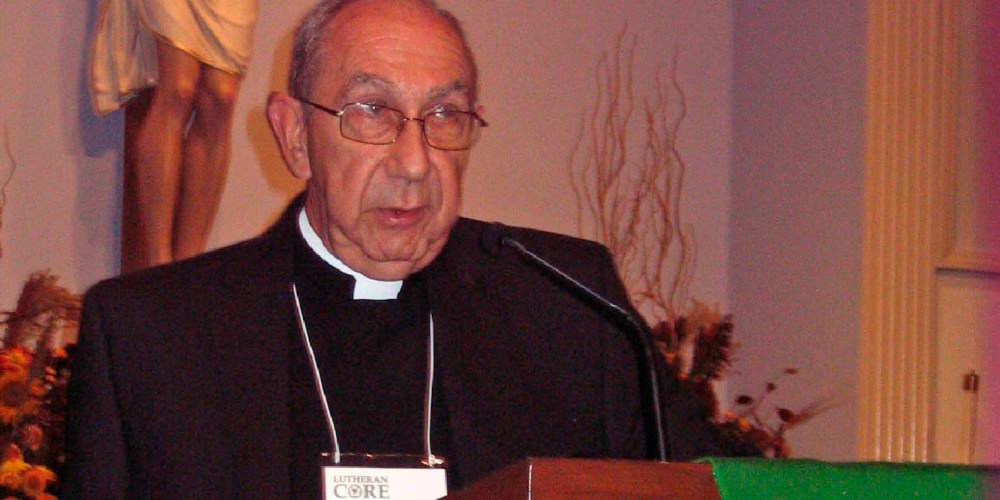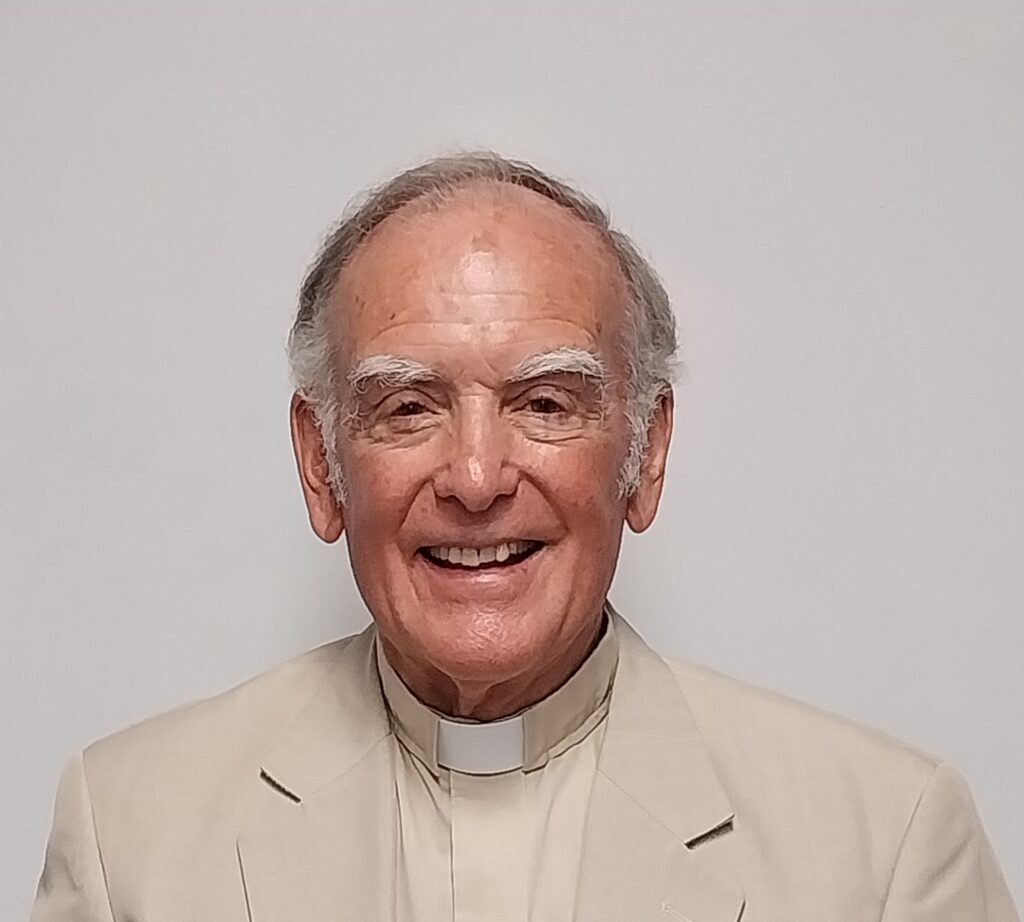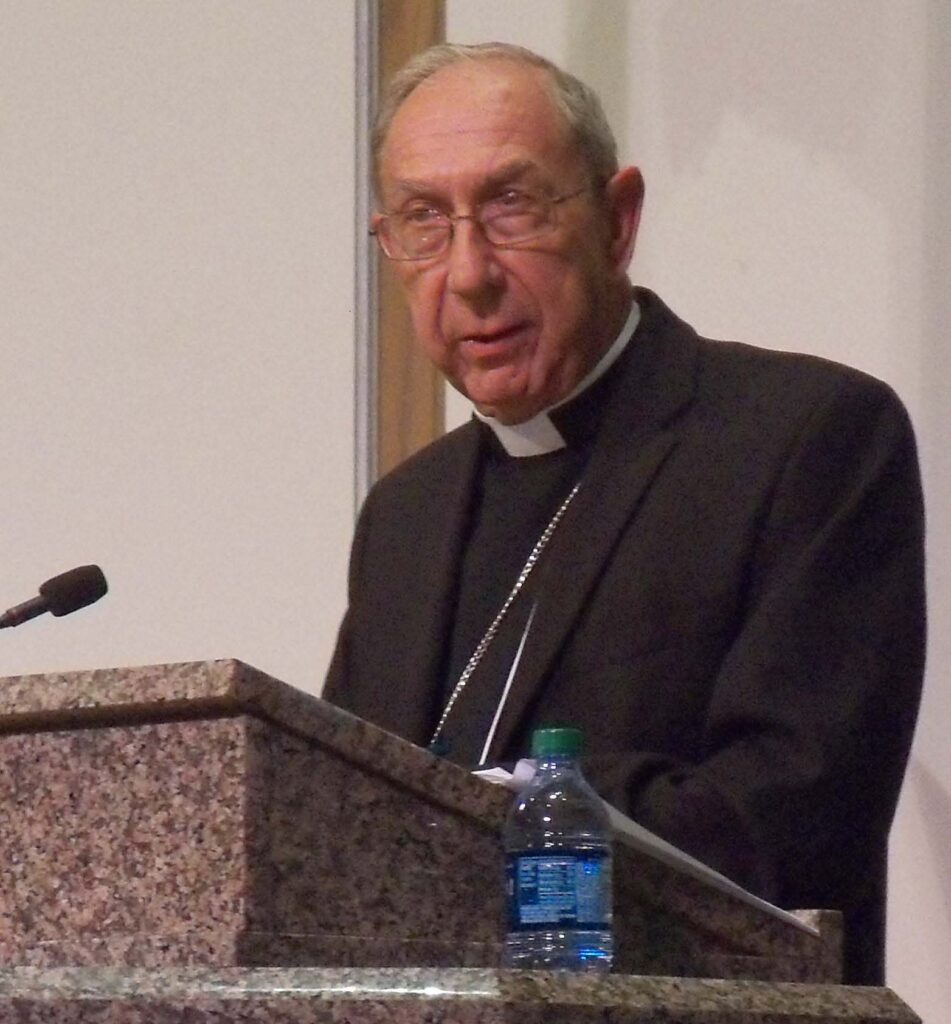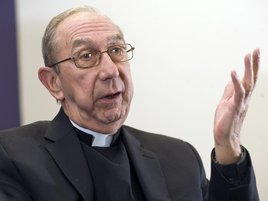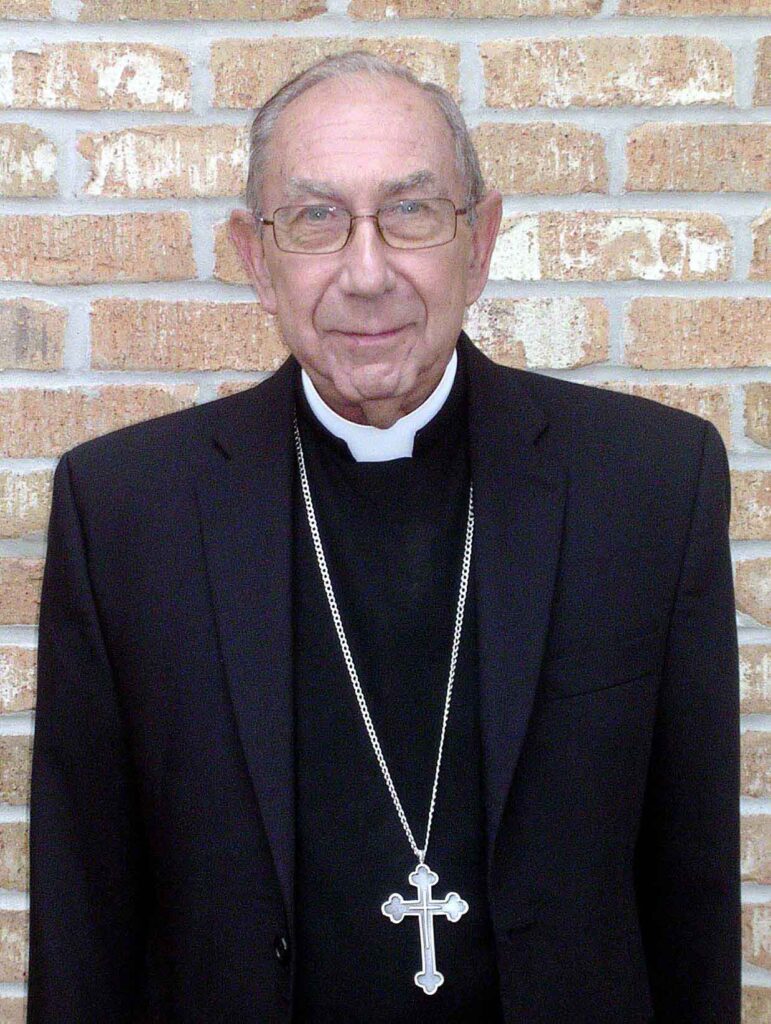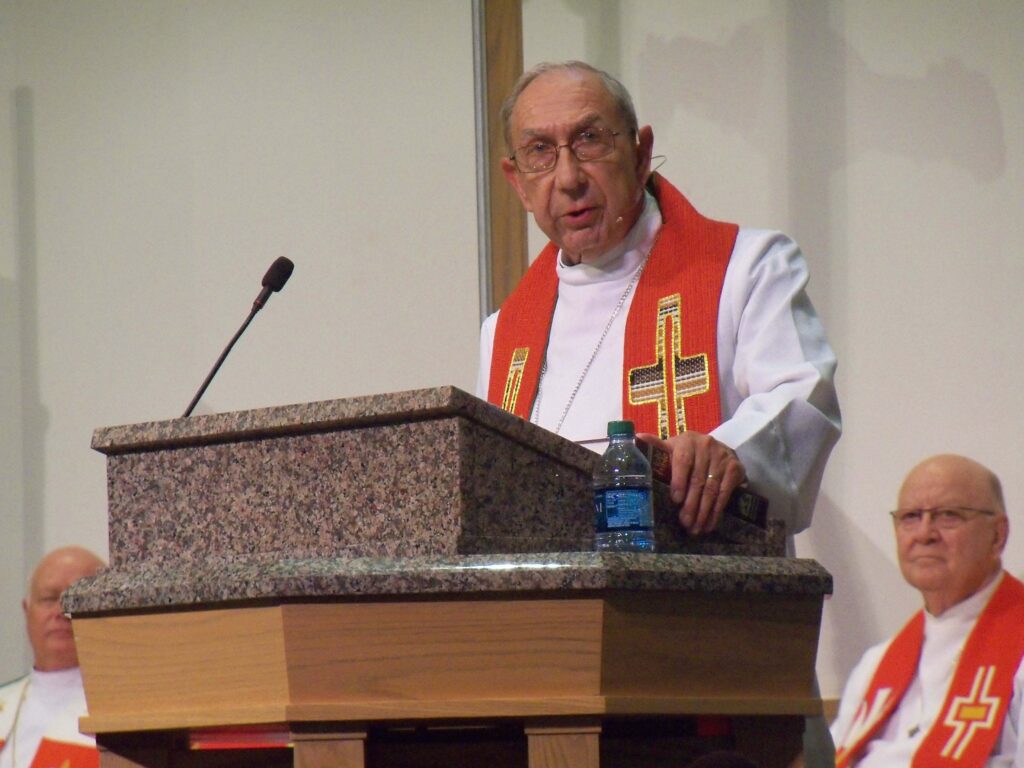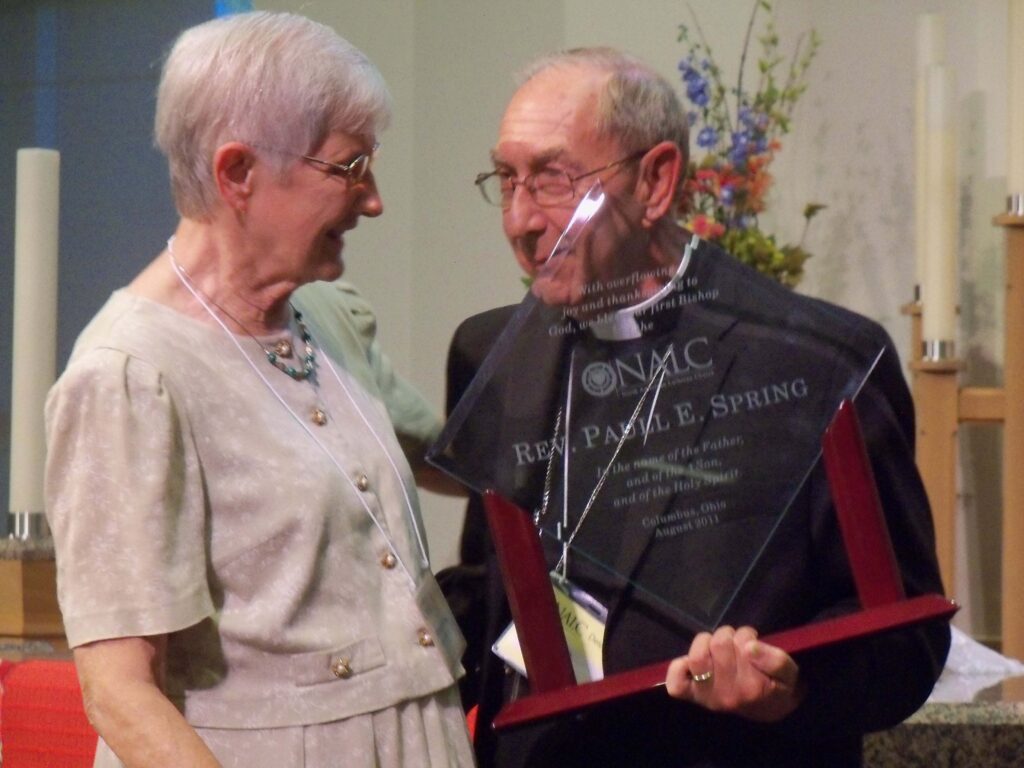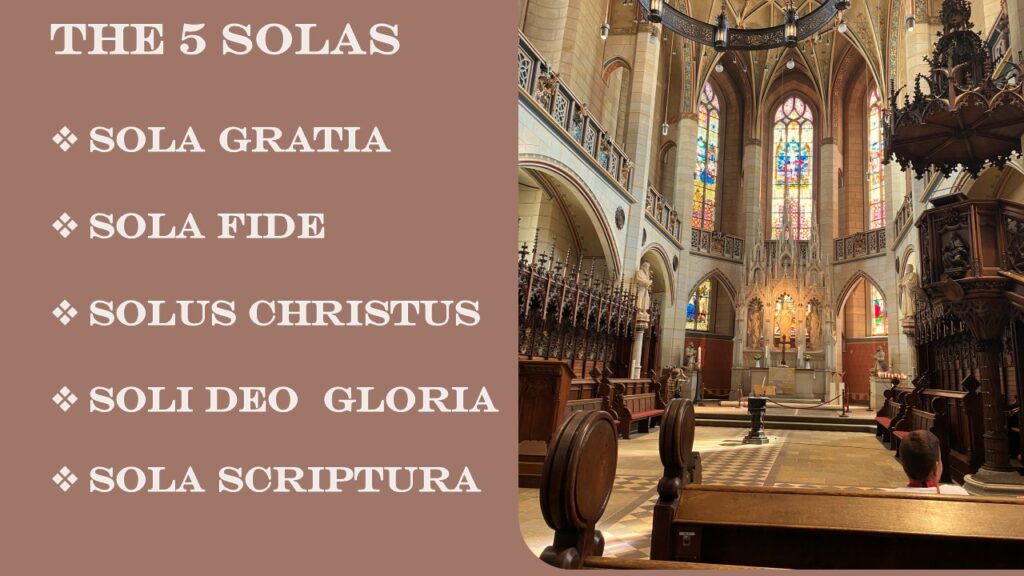IT WAS BAD, BUT IT COULD HAVE BEEN WORSE:
REVIEW AND ANALYSIS OF THE 2025 ELCA CHURCHWIDE ASSEMBLY
by Dennis D. Nelson
That is how I would sum up the 2025 ELCA Churchwide Assembly. It was bad, but it could have been worse. (2028 will probably be worse.) For the most part, the voting members did not force the issues beyond what was being recommended, as had been feared, and on one important matter even showed some restraint. I live in the Phoenix area, so I was able to attend most of the assembly in person as a visitor. Being there in person you can get the “feel of the room” and also observe the makeup of the group.
- INITIAL OBSERVATION
The first thing I noticed was how many young people and people of color there were. I do not have the actual statistics, but a couple people at the microphone said that there were 137 people – or 17% of the voting members – who were under the age of thirty at the time of election. The ELCA has certainly succeeded in creating the assembly makeup that they have wanted, even if some of the votes did not go as far as they would have desired.
- ABUSE OF POWER
There is over-the-top euphoria over the election of the new presiding bishop. Lutheran CORE experienced the worst kind of bullying and abuse of power behavior from him, as we described in our Summer 2023 and October 2023 Letters from the Director. For several years Lutheran CORE had held a Spanish language and bi-lingual ministry Encuentro at an ELCA church in northwest Chicago. The event was organized and led by an ELCA pastor who was also doing supply preaching at the congregation with the full knowledge of the previous synodical bishop. After Yehiel Curry was elected bishop of the Metro Chicago Synod he threatened that pastor with removal from the ELCA clergy roster (even though he was rostered in another synod) if he did not immediately cease providing pulpit supply. Bishop Curry then brought in an entourage to take over and close the congregation (citing S.13.24 in the model constitution for synods). In shutting down the congregation he showed no respect, regard, consideration, or appreciation for the current congregational leaders and the decades of faithful ministry that had taken place at that location (including the decades of faithful ministry by the father of the current congregational leaders). He evicted the sons of the former pastor from the parsonage with thirty days’ notice, even though these brothers were maintaining the property and providing leadership for the congregation. After evicting the current leaders and forcing out the confessional supply preacher, he brought in two pastors from Peru, who introduced shaman-blessed, ayahuasca-induced seances. I read an article written by one of these Peruvian pastors. Her argument was that since the Conquistadores were so culturally insensitive when they conquered the Indigenous people, it is appropriate to honor and include Indigenous culture with shamans and ayahuasca (a hallucinogenic plant from the Amazon basin). I cannot imagine the Old Testaments prophets saying that since Joshua and company were so culturally insensitive about the way they came in and conquered the land of Canaan, it would be appropriate to have an altar to Baal in the Temple in Jerusalem.
I sent the article that I had written about Bishop Curry’s style and behavior to Bishop Eaton, Imran Siddiqui (vice president of the ELCA), and the person who was chairperson of the conference of bishops at the time. I never heard from any of them. ELCA leaders do not want to hear anything other than the official and preferred narrative. They will completely ignore a very valid and serious complaint about bullying and abuse of power on the part of a synodical bishop.
The ELCA values speaking truth to power. I was speaking truth about the abuse of power by the person who will soon hold the most powerful position in the ELCA. At the assembly we also heard about the ELCA’s Truth and Healing Movement as well as the truth-seeking and truth-telling initiatives revolving around Indian boarding schools. But here we see top ELCA leaders ignoring the truth about the behavior of a fellow leader.
- OBSESSED WITH DEIA
We have shared how the Lutheran Congregational Support Network has responded to ELCA synodical bishops who say, “Don’t worry; what you fear will never happen; the ELCA will always respect the integrity of congregations; the Lutheran Congregational Support Network is spreading lies and misinformation.” The words and behavior of one of the co-chairs of the Commission for a Renewed Lutheran Church totally invalidated that argument.
On a positive note, the “Recommended Minimum DEIA Standards for Congregations” that are listed in the DEIA (Diversity, Equity, Inclusion, and Accessibility) audit which the ELCA Church Council had done of its governing documents (DEIA_Report_Part_2.pdf ) are not yet mandatory, but it was obvious that certain powerful people and forces will not stop until they are. The wording of Memorial B14 – “Consideration of Recommendation 1 of the Commission for a Renewed Lutheran Church” – was not as strong as the wording of Recommendation 1 as it came from the Commission. You can find the Commission’s original wording in my article regarding Recommendations 1 and 7 in the May 2025 issue of our newsletter. But still the Memorial, which was approved 646-144, called for the church “to acknowledge the importance of accountability in addressing racism within all structures of the ELCA, to affirm the work of the Strategy Toward Authentic Diversity Advisory Team . . . and to direct the Church Council to add a timeline to its actions taken and to provide progress updates to this church with a final report by fall 2027, including possible constitutional changes.”
Carla Christopher, co-chair of the Commission, first celebrated the fact that within the two synods where she works LGBTQ sensitivity and cultural competency training are mandatory. Then she said that most recommendations of the DEIA audit are not possible with the ELCA’s current polity, so we need to preserve the possibility of a re-constituting convention. Vice president Imran Siddiqui in his response to the report of the Commission said that “DEIA work has to be a part of everything we do.” Later in the assembly one of the nominees for presiding bishop said that DEI means “of God” so DEIA must be of God. When the top three nominees for presiding bishop were asked to respond to certain questions, one of the questions they were given was how they would implement DEIA. And the Church Council has already cemented DEIA language and values into the governing documents of the ELCA through Continuing Resolutions which they have passed and which do not require approval by the Churchwide Assembly. But I was most alarmed later on during the gathering when Carla Christopher, co-chair of the Commission, exploded at the microphone because of the resistance to the constitutional amendment recommended by the Commission which would fast-track the approval process for amendments that come from the floor. Here is a recording of her stating emphatically, “We are giving the Council less than three years to make substantive changes to dismantle racism or we are going to need to rewrite the entire constitution at a special meeting.” Here is a recording. The process is already well underway to eventually make DEIA mandatory for congregations. Powerful people in powerful positions will not stop until it has happened.
During her report Bishop Eaton spoke of the need to keep the ministry of Word and Sacrament central within the life of the church. My heart was warmed as I heard her say that the proclamation of the Gospel through the Word and the administration of the sacraments are “the only thing given only to the church,” adding that she was concerned that “the church is not always clear on that.” After stating that “our communities are filled with justice-loving and compassionate atheists,” she asked, “What makes us different?” All of which sounds very good, and I have read her saying these things before, but they do not reflect ELCA reality. For the ELCA DEIA is the new gospel – even though DEIA is not Gospel. Instead DEIA is a law that always demands more and will never be satisfied. It took a motion from the floor – which was approved 678-120 – to add a question for the final two nominees for presiding bishop regarding their faith in Jesus and to share a Scripture passage or story which shapes and sustains them.
- A GLIMMER OF HOPE
I experienced a glimmer of hope when an amendment was presented, discussed, and even by a very narrow margin approved that removed language from the proposed amendment to Churchwide Constitution 22.11.b. As we discussed in our April 2025 Letter from the Director this amendment, if approved, would have provided a fast-track approval process for constitutional amendments that come from the floor. The amendment to the amendment was to remove language that added the phrase “or a subsequent two-thirds vote of the members of the Church Council taken within 12 months of adoption by the Churchwide Assembly.” I was encouraged to hear even some synodical bishops speak in favor of the amendment to the amendment because of the amount of suspicion and distrust already present within their synods regarding the ELCA. This was the discussion when, as I previously mentioned, one of the co-chairs of the Commission for a Renewed Lutheran Church exploded at the microphone, claiming that those who were in favor of the amendment to the amendment were silencing and disregarding marginalized people. (Her comments made me wonder what kind of amendments she wanted and planned to have come from the floor.)
But my glimmer of hope faded when later during the assembly a voting member proposed new language, which would provide for a provisional ratification of an amendment from the floor by a vote of the church council within twelve months and then a later ratification of the amendment by the next Churchwide Assembly. After much discussion about whether the new language was appropriate and how it would be executed, the assembly voted 517-247 to refer the motion to the Office of the Secretary for further study. This action raises the question of how newly elected Secretary Lucille “CeCee” Mills will interpret the constitution. The ELCA’s summary of Day Five quotes Secretary-elect Mills as describing the church’s constitution as “something that magnifies all of the things that we understand ourselves to be as Lutherans in the ELCA. . . . Making something a document that is living beyond the people who are writing it in the moment is really important.” Over the next few years we will find out what a “living” interpretation of the constitution means.
- MORE THAN MERELY “EDITORIAL CHANGES”
There were many who feared that the 2025 assembly would not be satisfied with the two-step approach that was given to the Human Sexuality Social Statement Reconsiderations Task Force. The concern was that the 2025 assembly might force a vote on the whole issue of bound conscience. That kind of premature action did not happen. The vote on bound conscience, which is the provision which gives a place of dignity and respect also to traditional views and those who hold them, is scheduled to take place in 2028. As we described in an article in the January 2025 issue of our newsletter, the task force was claiming that they were merely recommending “editorial changes.” “Substantive changes” – such as what to do about bound conscience – will not be considered until 2028. But I would not call the 2025 changes, which amount to no less than a full embrace of every form of gender identity and every sexual orientation – merely “editorial changes.”
The assembly stayed within the boundaries of the first step in the process except for one motion that came from the floor. That motion was to remove the phrase “between a man and a woman” from the language “The Christian tradition has historically defined marriage to be a covenant between a man and a woman, as reflected in the language of Genesis.” The rationale for the amendment was that the current wording is harmful to LGBTQ people and does not correspond to their lived experience. The claim was that merely reminding people that marriage between one man and one woman has been the historic teaching of the church was traumatic and upsetting. The maker of the motion argued that rather than waiting three more years when bound conscience will be considered, something could be done now to make the social statement less harmful. The amendment to the amendment was adopted 552-211, and the revised social statement was approved 742-46. We saw three things happening here. First, the re-writing of history to eliminate what some people find hurtful or harmful. Second, the defining of truth as something that conforms to some people’s liking and lived experience. And third, a preview of what is to come in the 2028 reconsideration of bound conscience.
A member of the task force who was one of those who made the presentation spoke of the desire that there be “a place for each of us in this church.” He also said, “We understand that we may not have your trust, but we hope moving forward we can earn it.” Depending upon what happens to bound conscience in 2028, we will know whether the ELCA can be trusted.
The assembly approved (748-15) “The Common Statement on the Filioque,” an agreement between the Lutheran World Federation and the Eastern Orthodox Church. The term “filioque” has to do with the phrase in the Nicene Creed that the Holy Spirit “proceeds from the Father and the Son.” This agreement does not call for the removal of the “filioque.” Instead it created a common understanding between Lutheran and Orthodox church bodies, allowing both versions to be recited.
Much has been written and said about this decision’s showing that the ELCA cares more about church unity than doctrine. But what I would like to focus on is Bishop Eaton’s comment that if Lutherans and Eastern Orthodox Christians can overcome a thousand-year division over this much greater issue, then we certainly should be able to overcome division over much lesser issues today. Either Bishop Eaton is trying to minimize it or she does not understand what the full impact will be if the ELCA makes DEIA mandatory for congregations and/or eliminates the provision for bound conscience.
- UNDERREPRESENTED GROUPS
There was a very interesting amendment to bylaw 5.01.E19 that was approved by a vote of 530-236 to increase the percentage goal of youth and young adult voting membership of the Churchwide Assembly, Church Council, and churchwide boards and committees from 10% to 20%. I have already mentioned the large number of youth and young adults who were voting members of the 2025 assembly. This representation was to be on top of constitutional amendment 12.41.11.e, which states that in addition to their regular number of voting members for the Churchwide Assembly, synods may elect one additional voting member who is a member of a historically underrepresented group and one additional voting member who is a person of color and/or a person whose primary language is other than English. Though the amendment was being recommended by the Church Council, the assembly voted 492-279 to refer it back to the Legal and Constitutional Review Committee of the Church Council.
As I mentioned in my article in the May 2025 issue of our newsletter, a Continuing Resolution passed by the Church Council defines historically underrepresented groups as including persons of color, persons whose primary language is other than English, persons of diverse gender identities, persons of diverse sexual orientations, persons experiencing poverty, persons of lower income, persons living with disabilities, and persons who are not natural-born United States citizens. If the Legal and Constitutional Review Committee ends up recommending and a future Churchwide Assembly ends up approving this amendment, a large number of the positions in churchwide assemblies, the church council, and churchwide boards and committees will be given to youth, young adults, and members of historically underrepresented groups. Since a large percentage of the members of the majority of ELCA congregations are old white people, who will then be the underrepresented group?
The Churchwide Assembly extended much acknowledgement and consideration to Indigenous people. There was the required opening land acknowledgement, an evening Powwow, a Day of Remembrance for Murdered and Missing Indigenous Women and Girls, and much discussion and repentance over the ELCA’s complicity in the abuses caused by Indian Boarding Schools. But there is one major way in which the ELCA rejects a basic value of Indigenous people – the respecting and valuing of the wisdom of tribal elders.
- ENDLESS CONFESSION
I stayed Friday afternoon for the Service of Confession and Repentance for Sexism and Patriarchy. It seemed strange that I was being called on to repent of Sexism and Patriarchy in the midst of the following realities. The two top elected leadership positions in the ELCA at the time were being held by women. The Conference of Bishops is pretty equally divided between men and women. A majority of ELCA seminary presidents are women. A majority of the members of the Commission for a Renewed Lutheran Church are women. A majority of leaders of Lutheran churches in other countries who greeted the assembly were women. And I did not keep a running tally, but it seemed that the majority of people who went to one of the microphones to speak were women.
As I said before, DEIA is the new gospel of the ELCA – even though DEIA is not Gospel. Instead it is a law that always demands more and will never be satisfied. You can never grovel, repent, apologize, and change your ways enough.
There was also a very interesting phrase in one of the petitions during the service. God was addressed as “Holy midwife.” Now I am not surprised that the designers of the service would want to include every possible feminine image for God, but “Holy midwife”? Think about it. A midwife does not procreate. A midwife does not bring about new life. A midwife merely helps deliver new life that has been created by others. The image of God as “Holy midwife” diminishes God from being “the one through whom all things were made.”
- THE RISKS OF BEING WOKE
And now I would like to conclude by sharing two things that say a lot about the risks of being Woke.
First, Tuesday was the day that everyone was to wear red in solidarity with Murdered and Missing Indigenous Women and Girls. When the ELCA treasurer came to the podium to give her report, she was wearing red. She said that it was not good for a treasurer to wear red, so she ducked behind the podium and came back up wearing green. Everyone – or at least almost everyone – chuckled.
As the last item of the day, one person went to the microphone and shared how triggered and offended she was by someone’s making light of such a serious and sacred thing as a Day of Remembrance for Murdered and Missing Indigenous Women and Girls. What a downer way to end the day. But it did show that Woke will always find something to be triggered and offended about and by.
Second, on Friday afternoon someone made a substitute motion to amend the language of bylaw 7.31.02.a.8, striking the proposed phrase and replacing it with words including “giving special honor to members of historically underrepresented groups.” Several people of color went to the microphone to say that they are looking for justice and equality, not special honor. When the maker of the motion was asked where the language of “special honor” came from, she replied from Paul in 1 Corinthians 12. Bishop Eaton asked her, “Have you read that passage?” That question alone should have been cause for alarm. The substitute motion was defeated (703-52).
A few minutes later a voting member went to the microphone and shared how livid and offended she was because of what 1 Corinthians 12: 24 actually says. “God has so arranged the body, giving the greater honor to the inferior member.” The maker of the substitute motion was calling members of historically underrepresented groups inferior members. The voting member said to the maker of the motion, “You have hurt me in a way you will not believe.”
Two lessons for all who want to be Woke –
- Be always ready to always be triggered and offended.
- Be very careful in your quotation and interpretation of Scripture.
I said at the beginning that the 2025 ELCA Churchwide Assembly was bad, but it could have been worse. Will the 2028 Churchwide Assembly be worse? It could be. It will be worse if bound conscience is eliminated and constitutional amendments are approved so that DEIA becomes mandatory for congregations. Will that happen? There are powerful, preferred, and well-positioned people who are determined it will happen and will not stop until it happens. We will continue to monitor.
Trusting in Jesus the Lord of the Church,
Dennis D. Nelson
Executive Director of Lutheran CORE
* * * * * * *
VIDEO MINISTRIES
TOOLS FOR WORSHIP PLANNING – PART ONE
by Cathy Ammlung
Many thanks to NALC pastor Cathy Ammlung for this first in a series of videos intended to provide congregations – especially those with temporary and/or longer-term pastoral vacancies – with some tools for worship planning. A link to Cathy’s video can be found HERE. A link to our You Tube channel, which contains sixty reviews of books and videos on topics of interest and importance, can be found DEIA_Report_Part_2.pdf.
In this video, Cathy talks about why worship planning is important. She describes the “flow” of the liturgy, how that actually helps create faithful worshippers, and how it creates a “reality check” for what you may be planning. She discusses some alternatives when there’s not a Communion service.
Cathy then gives a brief preview of the other topics that will be covered in more detail in future videos: the church year; lectionaries and how to navigate them as you plan worship over a season; hymn selection and getting the most from the hymnals; and selecting, writing, and praying intercessory prayers. An outline of these things can be sent to you as an email Word attachment. You can contact her at [email protected].

